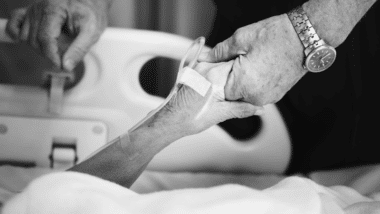Manx politicians have been warned that their plans to legalise euthanasia and assisted suicide on the island are unworkable.
Palliative medicine consultant Baroness Finlay of Llandaff and consultant nephrologist Dr David Randall said MHK Alex Allinson’s Assisted Dying Bill was complex and dangerous.
Earlier this month, members of Tynwald’s lower Branch, the House of Keys, voted to change the residency requirement from one to five years, and extend the life expectancy criteria from six months to one year.
Problematic
Appearing before the House of Keys last week, the experts addressed MHKs’ questions, including concerns over the Bill’s impact on palliative care, possible legal challenges to remove ‘safeguards’, the danger of coercion, and the need for psychiatric assessments.
Reflecting on the experience, Lady Finlay told Manx Radio: “I think the questions that we’ve been asked have been very relevant, very perceptive, and have really explored some of the complexity of this legislation.”
But, she explained, the nature of the questions had only served to expose serious problems with the Bill, before adding: “I think, as it’s written, it’s unworkable.”
Dr Randall said the Bill marked a huge ethical shift, such that doctors could “actually act to shorten life”. He advised the Isle of Man not to go ahead with legalising euthanasia and assisted suicide but rather to invest in palliative care.
Human rights
Giving evidence before the House of Keys a fortnight ago, legal medical specialist Charles Foster warned the Bill would be open to challenge at the European Court of Human Rights, regardless of any amendments.
He said that removing any end-of-life protections may breach the European Convention on Human Rights, which protects everyone’s “right to life” and public safety.
In addition, he said it could be against the right to “freedom of thought, conscience and religion” if medics are required to refer people for euthanasia.
After the Bill completes its Clauses Stage, it will have its Third Reading, before proceeding to the Legislative Council for consideration.
‘Misplaced faith’
In a recent letter to the Times, Lady Finlay said there was “misplaced faith in the ‘safeguards’ surrounding assisted suicide”.
She said that prognosis is often used to support “the provision of lethal drugs to those who fulfil arbitrary criteria”, but, she continued, “any doctor will tell you that prognosis is guesswork at best, especially when it comes to weeks or months.
“Another proposed ‘safeguard’ is for doctors to detect coercion — yet doctors are trained to trust what their patients tell them and rarely detect financial or emotional coercion. Our fear of bad care shows we must challenge care, not the law.”

Netherlands: Physically healthy young woman scheduled to die by euthanasia
Belgium: Insurance boss backs euthanasia for elderly to save money
MPs champion a society of ‘hope and value’ over assisted suicide

